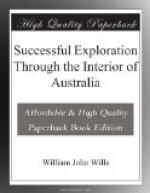. . .
From Major Egerton Warburton.
Adelaide.
My dear Dr. Wills,
Vain as must be any consolation that can be offered to you under the circumstances of almost unparalleled distress attending the loss of your son, I cannot but avail myself of our acquaintanceship to express my most humble and hearty sympathy in the terrible catastrophe.
Anger and horror combine to drive us away from the contemplation of the causes of this tragic termination of a feat of heroism and endurance such as has been rarely before achieved; and we turn with deep sorrow and admiration to dwell upon that noble display of faithful, patient courage which calmly awaited an early and unbefriended grave on the spot where the foot-prints of triumph were reasonably to have been expected.
We all share in your grief; and would fain hope that this may somewhat lessen its bitterness to you; but it must be a source of pride and comfort to you to remember that your son died having done his duty to his country and his companions. More than this no man can do, live he ever so long, and few there are who do so much.
Permit me to subscribe myself a deep sympathiser with you in your affliction,
J. Egerton Warburton.
The Major had been a candidate for the office of leader, but his conditions as to his second were objected to. The next letter is from a gentleman who had accompanied Major Warburton as second on some explorations from Adelaide. At Totnes I knew him when a boy.
. . .
Dorset Terrace, Adelaide.
My dear sir,
I truly sympathize with you in the loss you have met with in so heroic and superb a fellow as your son. I cannot read his journals without wishing that I had been with him, for his qualities as an explorer were perfect in my humble opinion. The news of his sad death has been a great blow to all of us, and we sincerely feel for you in your affliction. But though dead in the flesh, the brave spirit of your son will stand emblazoned on the pages of our country’s history as one of those heroes who have died for the cause in which he was engaged, in the flush of victory, cheerfully fulfilling his duties to the last.
I cannot believe that Wright and Brahe ever returned to Cooper’s Creek. If they had done so a stockman so well experienced in tracking as Wright must be, would have detected the presence of signs that might escape the eye of one less practised; for it is ascertained now that the stores had been removed about the time that Brahe left, and before, as they say, they returned in company.
I also believe that, had Burke taken his companions’ advice, and followed down Brahe’s tracks, they would have been saved, for it is well known to all travellers that animals will feel cheered in following the footsteps of their late associates; but to attempt to force his party to explore new country when a well-known route was open to him was little short of madness. I have not patience to criticize Wright and Brahe’s conduct. If Brahe had even left more stores, clothing especially, we should have had the pleasure of welcoming the explorers home.




